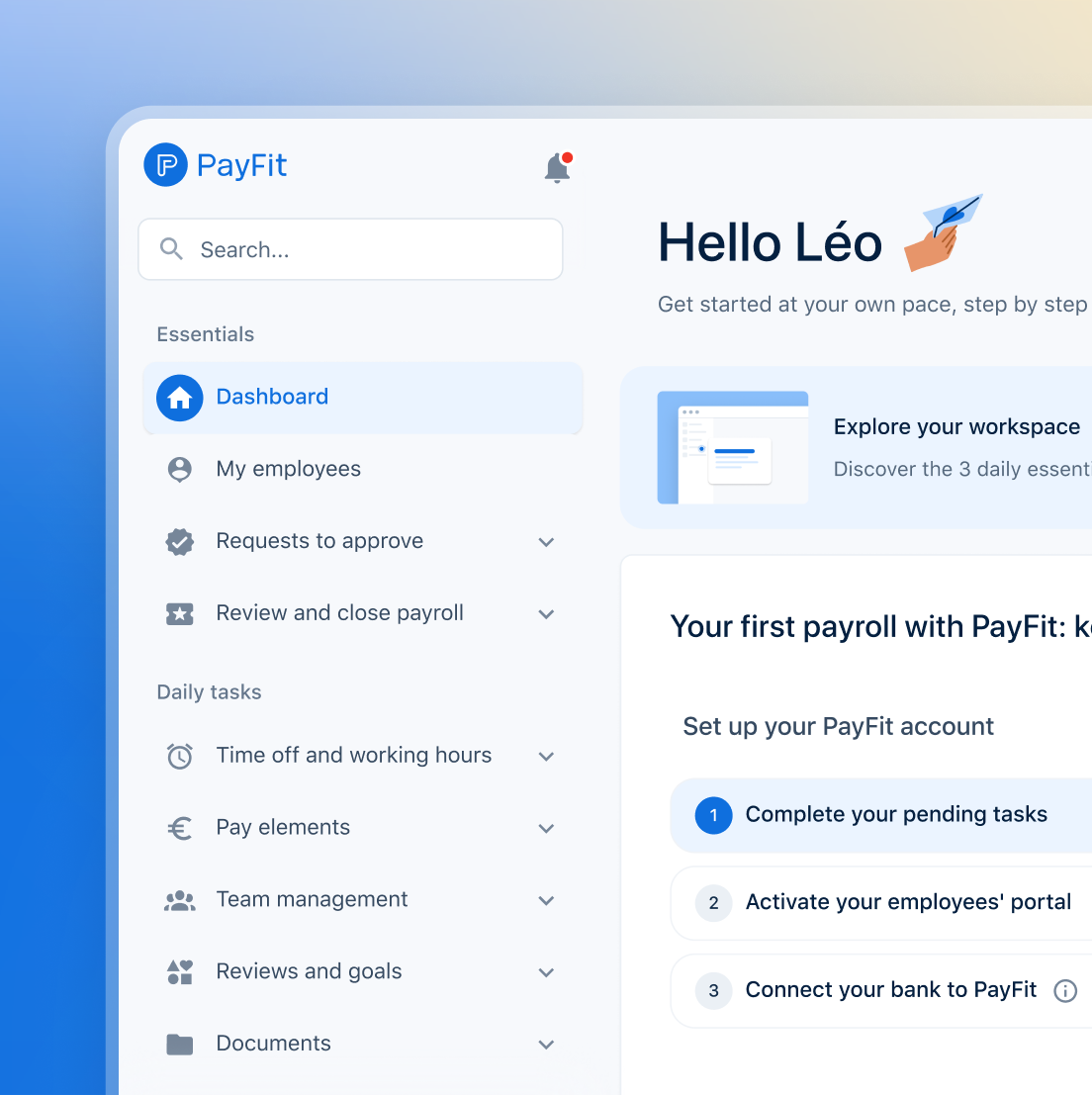✨ Health insurance, now in PayFit - learn more
💷 All the rates & thresholds you need to know for 25/26...right here
✨ The Payroll Journey: Start, Scale & Succeed Globally - learn more
✨ Health insurance, now in PayFit - learn more
💷 All the rates & thresholds you need to know for 25/26...right here
✨ The Payroll Journey: Start, Scale & Succeed Globally - learn more
You’ll want to avoid HMRC fines and penalties because they can get expensive. But if HMRC detects inconsistencies or incorrect information in your latest tax return, your organisation might also get audited.
Most of HMRC’s audits happen when they believe something is wrong. So by keeping your tax returns accurate and tax paid on time, the chances of HMRC auditing you are slim.
If you do not send HMRC the number of Full Payment Submissions (FPS) they expect, you send it late, or you fail to send your Employer Payment Summary (EPS), you can get a penalty.
These penalties directly correlate with the number of employees you have — the more employees, the more you can expect to pay.
| NUmber of employees | Monthly penalty |
|---|---|
| 1 to 9 | £100 |
| 10 to 49 | £200 |
| 50 to 249 | £300 |
| 250 or more | £400 |
It’s not just paying the penalty you should worry about. Not sending an FPS or missing the deadline impacts your employees, too. It can have an effect on income-related benefits, including Universal Credit.
So reporting on time and correctly is in everyone’s best interest.
You’d usually need to submit and pay your VAT return after each accounting period (every three months). The deadline for this submission is one month and seven days after the end of an accounting period.
The good news is that you don’t have to pay a surcharge if you submit your VAT return late the first time. But if you default again, you can expect to pay a surcharge of up to a maximum of 15%.
Penalty-wise, HMRC can charge you up to 100% of any tax understated or over-claimed if your return is inaccurate. However, if you have no tax to declare, you won’t receive a penalty for a late return.
All companies liable to pay Corporation Tax must meet certain HMRC requirements, including any deadlines. If you notice you’ve made a mistake and notify HMRC immediately, you can avoid facing penalties.
If you don’t have a reasonable excuse for not paying your Corporation Tax, you can expect a penalty which will be a percentage of the tax you owe.
If something has changed in the business and you don’t notify HMRC, you can expect a fine. So let’s say your new company has made a profit; you’re liable to tax, so you need to tell HMRC. Or, if now your organisation is liable to pay Corporation Tax, you need to tell HMRC.
Basically, anything that affects your liability to tax (including VAT), you need to notify HMRC, or you’ll be penalised.
If you’re unsure about anything, you should always seek advice directly from HMRC.
Payroll audit guide & checklist
The most obvious consequence of not filing your tax returns on time and accurately is receiving a fine or penalty. Or, HMRC can conduct an audit if it spots inconsistencies or incorrect information in your latest tax return.
But if you fail to pay your penalties, what happens then?
If you cannot pay your tax bill in full, HMRC will ask you how much you can realistically aid each month. You will then have an instalment plan known as a ‘Time to Pay’ arrangement. HMRC will only agree to this if they think you will pay on time each month.
If you default from the payment plan, HMRC has several options. One includes taking payment for tax out of your wages directly from your bank account. Or they can take and sell your possessions to recover outstanding tax debts - called ‘distraints’.
Although you’re unlikely to receive a prison sentence for tax evasion, HMRC can take you to court. You might have to pay their court fees and your court fees plus the tax, penalties and surcharges you owe.
If you’re wondering how to avoid HMRC fines in the future, here are some pointers.
Always give accurate figures. When filing your return, you can save your progress as you go in your HMRC account. So fill out what you know and then go back to the bits you’re unsure about. Then you don’t have a tax return to fill in from scratch closer to the deadline.
Always double-check your calculations and get someone else to check them, too (unless using payroll software). HMRC will dish out fines and penalties for lazy tax returns. If you’re tripping up over expense calculations, consider implementing expense management software to eliminate errors from the beginning of the expensing process.
Keeping accurate records is crucial to ensure you’re paying the right amount of tax. Records should include the employee’s gross pay, NICs, what tax you’re deducting under PAYE, employee tax codes, any student loan deductions and other things like taxable benefits and expenses.
To ensure they’re kept accurate, any changes to information must be updated in your payroll software — i.e. if someone receives a promotion, the manager should update the new salary immediately. To keep records up-to-date, your organisation must communicate effectively.
Legislation changes and you need to understand what and when it changes and how it affects your organisation. Managing payroll is such an important job — it impacts everyone in the company, even the CEO. But it’s also a big job, too. There’s so much to keep on top of that it can become overwhelming quickly.
Consider attending webinars and industry conferences and sign up for the HMRC’s employer bulletins to keep your legislation knowledge on top form. Or, if you have access to payroll experts through your software, use them — access their knowledge!
P.S. We have a whole bunch of in-house payroll experts just waiting to answer your payroll questions. Book a demo.
Sounds simple, but don’t miss an HMRC deadline. With plenty of deadlines to keep track of and running payroll itself, it’s a lot for one person to handle. But, that’s where payroll software can lend a hand.
Payroll software like PayFit can means you’ll never miss an HMRC deadline again. We’re HMRC-recognised, which means we automatically handle your RTI submissions (FPS and EPS). See how it works — book a demo.
The quicker you tell HMRC about your mistake, the less likely it is you’ll receive a penalty. Honest mistakes happen, so don’t just sit on them and hope HMRC don’t notice. Tell them immediately.
If you’re close to the deadline or you want to make a payment quickly, you can use Faster Payments over the phone or via online banking or by CHAPS. This clears on the same day or sometimes the next day.
Other options include by Bacs, cheque, or an existing direct debit; these can take three working days. You can also set up a brand new direct debit if you want, but this will take up to five working days.
Just remember to make the payment as soon as you receive it or within the 30-day window given to make sure HMRC receives payment in plenty of time before the deadline.
Be aware that if the deadline for payment falls on a bank holiday or a weekend, send payment in plenty of time to account for delays.
HMRC fines do not expire, so pay them promptly.
You can appeal your penalty if you have a reasonable excuse for late filing. Some acceptable circumstances, according to HMRC, can include unexpected stays in a hospital, the death of a close relative, or you had a life-threatening illness.
Reasons that aren’t acceptable include ‘my cheque bounced’ or ‘I couldn’t navigate the HMRC website’.
As long as you have a reasonable excuse for late filing, you have 30 days from the date HMRC sent the penalty to you to make your appeal.
You can make an appeal online or by post. To appeal against a late VAT return, you can fill in a late submission online form, or if you’re appealing against a penalty for PAYE, you can log into your HMRC account and simply select ‘appeal a penalty’.
If you don’t have an appeal form, you can send a signed letter to HMRC. Learn more about that here.

Looking to audit your payroll?

National Insurance varies based on a number of different factors. Learn about different UK National Insurance classes, from class 1 NIC to 4, here.
Learn how directors’ National Insurance works in the UK in 2026, including rates, thresholds, calculation methods, and key differences from employees.

Learn how to submit a Full Payment Submission (FPS) to HMRC in 2026, including deadlines, payroll data requirements, RTI rules, and how to avoid penalties.

Learn what an employer reference number (ERN) is in the UK, what it looks like, where to find it, and when you need one for payroll and PAYE admin.

Understand the difference between cumulative & non-cumulative tax codes. Ensure your UK payroll is accurate & HMRC compliant for 2026 & 2026/27.

Understand the PAYE reference number (ERN), learn where to find it, how to register as an employer with HMRC, and why it matters for payroll compliance.

See what's new in PayFit
New features to save you time and give you back control. Watch now to see what's possible